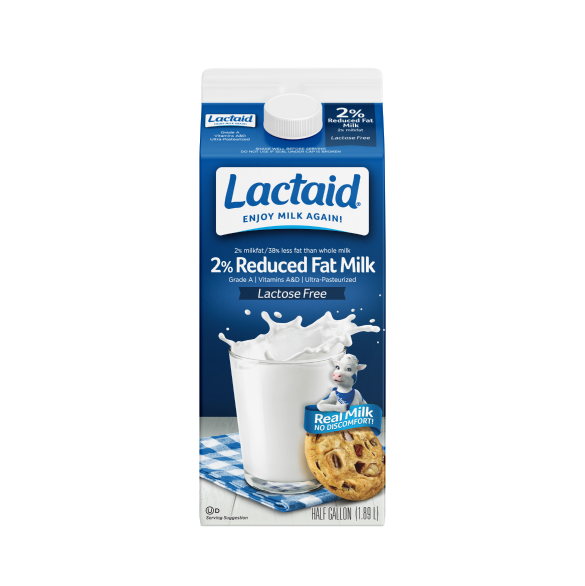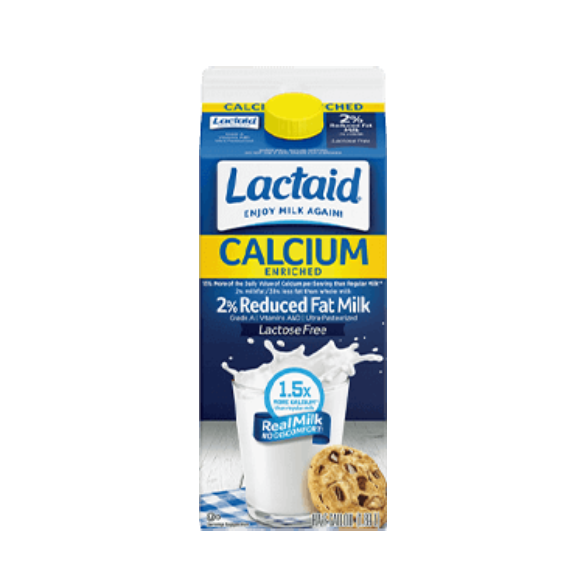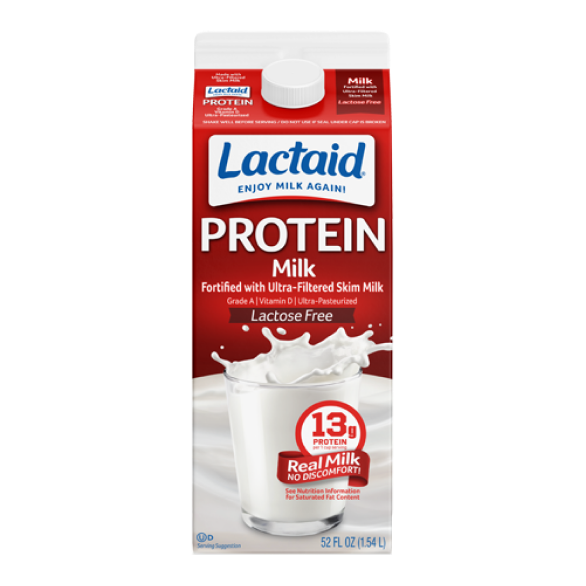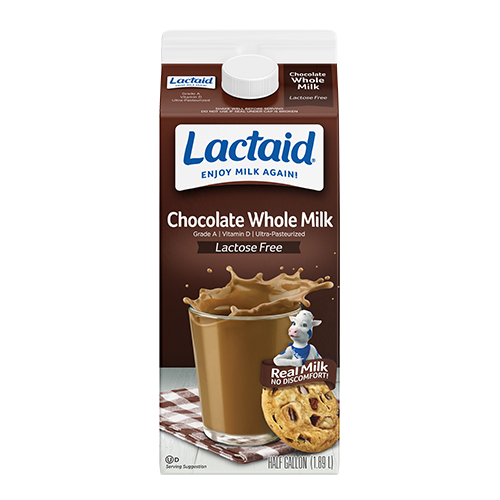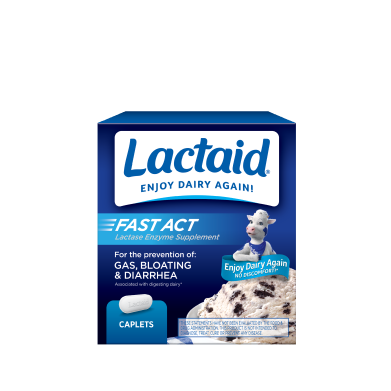Signs & Symptoms of Lactose Intolerance

You know the feeling – 30 minutes to a couple of hours after eating dairy, your stomach starts to grumble. You put up with it because you want to enjoy the taste of real dairy but feel uncomfortable every time you eat your favorite foods. If this sounds familiar, then you may be experiencing symptoms of lactose intolerance1.
Lactose intolerance, also known as lactose sensitivity, is a very common condition where the gut has problems digesting lactose, a sugar that’s naturally found in milk and other dairy products1. After eating dairy, symptoms of lactose sensitivity can kick in about 30 minutes to two hours after, depending on how much dairy you ate or how sensitive you are to lactose2. They can vary from a brief stomach rumble to nausea or even full-on diarrhea3.
Common Symptoms of Lactose Intolerance
If you’re sensitive to lactose, common symptoms you may experience include:
Bloating
Gas
Diarrhea
Stomach and abdominal pain
Nausea and vomiting
How Long Do Lactose Intolerance Symptoms Last?
It’s hard to pinpoint the exact time when lactose sensitivity symptoms start and end. But you’ll most likely experience symptoms around 30 minutes to two hours after eating dairy. Symptoms will often last until all the lactose in your gut passes through the body, which can take up to 48 hours4.
How Do You Tell if You’re Lactose Intolerant, or It’s Something Else?
Lactose intolerance, milk allergies and IBS all present with similar symptoms, but they are quite different conditions. Here’s everything you need to know:
Lactose Intolerance vs Milk Allergy
To put it plainly, lactose intolerance or sensitivity is a digestive issue caused by the inability to digest lactose (milk’s natural sugar), while a milk allergy is an immune system issue.
When you have a milk or dairy allergy, that means your body’s immune system is reacting to common proteins found in cow’s milk – like a casein allergy or whey allergy. While both disorders may share similar symptoms, a milk protein allergy is usually more serious than lactose sensitivity and must be treated differently5.
Common symptoms of a milk allergy, which do not occur with lactose intolerance or sensitivity, include:
Wheezing
Constriction of airways
A swollen tongue
Itching
Shock (with a drop in blood pressure)6
IBS vs Lactose Intolerance
IBS and lactose intolerance are usually confused with each other because symptoms are almost identical. Irritable bowel syndrome, or IBS, is a condition that affects the stomach and gut. While the exact cause of IBS is unknown, it mostly occurs in people who have:
Anxiety, tension or emotional stress
A family history of IBS
An infection of the digestive tract
Women are also twice as likely to have IBS compared to men7.
Because it’s harder to diagnose IBS compared to lactose intolerance, your doctor might test you for lactose intolerance, celiac disease and other gastrointestinal disorders before narrowing it down to IBS.
While IBS symptoms can be strikingly similar to those of lactose intolerance, IBS is a bowel disorder, while lactose intolerance is a condition caused by your body’s inability to digest lactose7.
Dairy Sensitivity vs Lactose Intolerance
Dairy sensitivity is an umbrella term referring to any symptoms caused by lactose sensitivity or a milk allergy. When someone says that they’re ‘dairy sensitive’, they could be referring to a digestive or allergic issue with milk and dairy products. That’s why it’s so important to know the condition you have first before finding an alternative dairy product.
You might be missing out on the delicious taste of dairy simply because you think you have a milk allergy!
Symptoms like stomach pains and diarrhea are common in both lactose intolerance and milk allergies. However, lactose intolerance should be treated differently from milk allergies5.
Dairy allergies are pretty widespread in children. In fact, two in every 100 children under the age of four are allergic to milk. It’s also very common in babies8.
NOTE: If you have a milk allergy or suspect your child has one, consult your physician first before attempting to eat any milk or dairy products.
If you know that you are sensitive to dairy, but you’re unsure if it’s lactose intolerance or a dairy allergy, try taking our quiz to help you determine the cause of your discomfort.
What Should I Do Next?
Before you stop eating dairy because of a lactose sensitivity, try altering your diet to ease your symptoms. You can also try LACTAID® supplements or our other lactose-free products to see if that helps too. If your symptoms don’t clear up, be sure to mention this to your healthcare professional.
When To See a Doctor
While lactose intolerance is not considered life-threatening, severe lactose intolerance and reactions to milk allergens can be serious. You should seek immediate medical attention if you:
Get hives
Develop rashes
Have trouble swallowing
Start wheezing
Experience tightness in the throat
Start swelling in the lips and face6
Don’t see your question? Visit our FAQs page.
References
Storhaug, C. L., Fosse, S. K., & Fadnes, L. T. (2017). Country, regional, and global estimates for lactose malabsorption in adults: a systematic review and meta-analysis. The lancet. Gastroenterology & hepatology, 2(10), 738–746. https://doi.org/10.1016/S2468-1253(17)30154-1
Lactose Intolerance. (2023, 03 03). Cleveland Clinic. https://my.clevelandclinic.org/health/diseases/7317-lactose-intolerance
Everything You Need to Know About Lactose Intolerance. (2019, August 3). Healthline. https://www.healthline.com/health/lactose-intolerance
How Long Do the Symptoms of Lactose Intolerance Last? (2020, April 14). Healthline. https://www.healthline.com/health/how-long-do-lactose-intolerance-symptoms-last
Dairy Allergy vs. Lactose Intolerance: What's the Difference? (2020, April 14). Healthline. https://www.healthline.com/nutrition/dairy-allergy-vs-lactose-intolerance#dairy-allergy
Milk Allergy. (2022, June 16). Mayo Clinic. https://www.mayoclinic.org/diseases-conditions/milk-allergy/symptoms-causes/syc-20375101
How to Tell the Difference Between IBS and Lactose Intolerance. (2021, May 1). Healthline. https://www.healthline.com/health/ibs-vs-lactose-intolerance
Lactose Intolerance vs. Dairy Allergy. WebMD. https://www.webmd.com/digestive-disorders/lactose-intolerance-or-dairy-allergy







